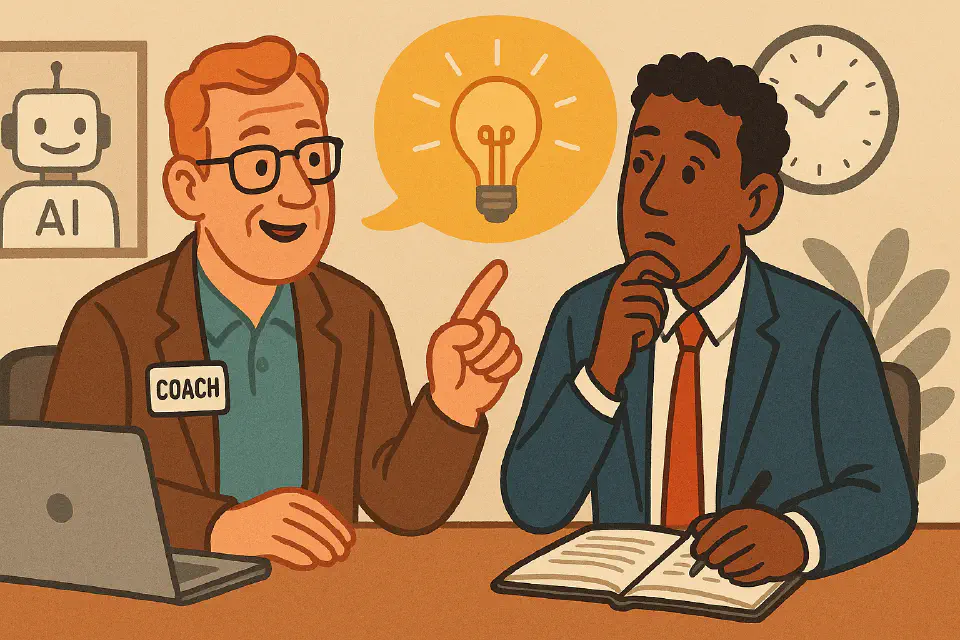
Does Coaching Work? Unlocking Potential in the Age of AI
The coaching industry is now worth billions, but what’s the real ROI? This in-depth guide explores how coaching works, when it doesn’t, and what every HR leader should know to make it count.
Coaching is no longer a luxury—it’s a leadership essential. But is it working?
With executive coaching ballooning into a $9.3 billion industry by 2023 and forecasted to reach $27 billion by 2032, many organizations are asking the same question: what exactly are we paying for? And more importantly, what are we getting in return?
This guide digs into the real impact of coaching—on people, performance, and potential. We explore how coaching works, what makes it succeed or fail, and how AI is transforming the coaching landscape.
What Is Coaching—Really?
The word coach dates back to the 1840s, originally slang for a tutor who “carried” students through exams. That metaphor still holds: modern coaching is about helping people move from where they are to where they want to be.
It’s not mentoring, not therapy, and definitely not training. Great coaching is built on three pillars:
- Curiosity over instruction: Coaches ask powerful questions instead of giving advice.
- Active listening: Coaches reflect and reframe what’s said to spark insight.
- Accountability: Coaches help clients follow through, not just dream big.
Does Coaching Work? The Evidence
Let’s cut to the chase: does it actually help?
The research says yes—if done well.
A 2022 study from the International Coaching Federation (ICF) found that:
- 80% of coachees improved self-confidence
- 73% improved work performance
- 72% improved communication skills
A 2023 Forbes guide on coaching ROI showed that executive coaching improves:
- Decision-making quality
- Strategic thinking
- Leadership presence
But here’s the catch: coaching isn’t a silver bullet. Its success depends on the readiness of the coachee, the skills of the coach, and the clarity of the goals.
Real Stories, Real Impact
Coaching may sound abstract, but its results are often deeply personal.
Jan Marchant, former MD at Tesco, hired a coach during a leadership transition:
“We worked on impact, influence, and staying authentic. My coach didn’t just tell me what to say—she helped me find a whole new way to communicate. It was transformational.”
These stories aren’t outliers. They show how coaching can unlock soft skills that are mission-critical for modern leadership.
When Coaching Fails
So what goes wrong when coaching doesn’t deliver?
Also, organizations sometimes treat coaching as a last resort or punishment rather than a developmental gift.
Best practice? Make coaching part of the growth culture, not a remedial fix.
Coaching vs. AI Coaching
With the rise of generative AI, a new question is emerging: Can coaching be automated?
AI-driven platforms now offer:
- Feedback on communication style
- Sentiment analysis from meeting transcripts
- Goal tracking and nudges
The future is blended: AI for scale and tracking, human coaches for empathy and nuance.
The Psychology of Readiness
Not everyone is coachable. And that’s okay.
A core success factor is readiness—openness to change, feedback, and self-exploration.
Signs someone is coach-ready:
- Curious, not defensive
- Willing to set goals and follow through
- Able to reflect on their behaviors and mindset
The role of HR is to assess that readiness before investing.
Soft Skills Are the Hard Edge
What do leaders actually gain from coaching?
According to behavioral science research and HR leaders:
- Confidence and self-awareness
- Presentation and storytelling skills
- Stakeholder influence
- Leadership clarity under pressure
- Resilience and emotional agility
These aren’t “nice to have.” They’re executive differentiators.
Coaching Strategy: Doing It Right
If you’re investing in coaching, here’s how to make it work:
- Set clear goals: Link coaching outcomes to role expectations or development plans.
- Select the right coach: Match expertise and chemistry.
- Create feedback loops: Include sponsors or managers in the process where appropriate.
- Track progress: Set cadence for reflection, course-correction, and measurement.
- Celebrate wins: Acknowledge behavioral shifts, not just business metrics.
Human Coaching Isn’t Going Away
AI may revolutionize how we manage performance, but it won’t replace human insight anytime soon.
Even as AI grows smarter, the best results will come from a hybrid model:
- AI: For scale, consistency, nudges
- Humans: For nuance, emotion, and trust
The next generation of coaching is about personalization at scale.
Final Thought: Does Coaching Work?
Yes—when it’s done with intention, skill, and partnership.
Coaching is not about fixing people. It’s about amplifying them. Helping already strong leaders go further, faster.
And in a world where change is constant and performance is personal, that may be the most valuable investment an organization can make.
Stay curious. Coach early. Lead better.
Want to embed coaching into your leadership culture? Start with clarity, invest in the right voices, and don’t forget the human in human resources.